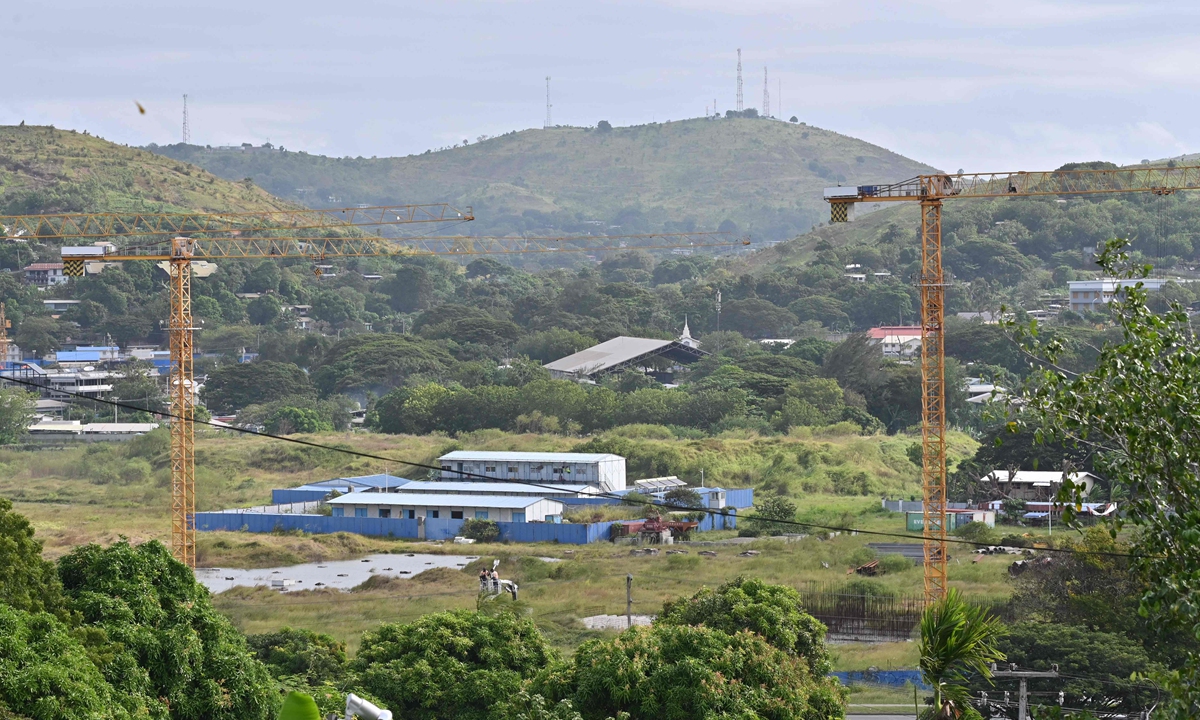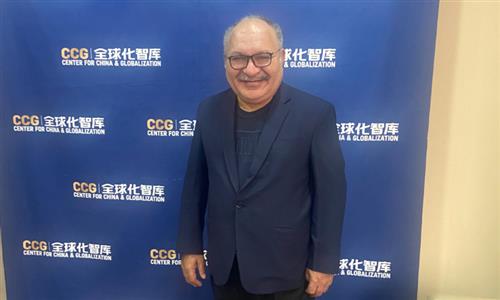
This picture taken on May 19, 2023 shows a construction project named Chinatown in Port Moresby, PNG. Photo: VCG
Editor's Note:
Concerns having been rising after US signed a defense and maritime surveillance agreement with Papua New Guinea (PNG) in May, with reports saying the US gets "unrestricted" access to PNG military bases. What is the biggest concern among PNG people? Papua New Guinea's former prime minister Peter O'Neill (O 'Neill) shared his views with Global Times (GT) reporter Wang Zixuan.
GT: The US, Australia and some countries are voicing "concerns" about the South Pacific under the excuse of China's so-called expanding influence in the region. What do you think of the zero-sum mentality of the US and Australia regarding China's cooperation with Pacific island countries (PICs)?
O'Neill: Understandably, countries like Australia are concerned about the expansion of China's influence in the Pacific. But I think if they know the challenges the Pacific islands face, China's experience is much needed in the Pacific. We have issues like climate change, which is a huge concern for us. So China's experience as a developing country in mitigating some of these problems is much needed in the region.
There are many other reasons, including the economic development of these countries, where there is suddenly a huge lack of foreign direct investment in our countries. I understand that the countries like Australia are worried about security arrangements. In our experience, China has never asked us to engage in security arrangements, so we have no concerns about it. We are always in the very strong economic and people-to-people relationship between our two countries.
Australia is a huge presence in many of the small island nations. So when China enters the region, it's a huge concern to them, but I think it's sometimes the emotional debates that take place, which certainly does not reflect the actual situation on the ground of how China is participating in the development and challenges that the countries face.
When you go to each of these areas, you'll see the infrastructure that China is helping to build. No one came to assistance to build local stadiums and the sporting facilities except China. I think there's probably a lack of balance in some of these debates that are taking place. In my view, China's economic rise in the region is something that we can't discount.
We need to embrace them and take the opportunities of this economic development brought by China. I think some of the geopolitical issues that are being debated is just sometimes protecting the single one or two countries' interests, not everyone. We need to take a balance.
GT: It is reported that the US gets "unrestricted" access to PNG military bases. This has aroused many concerns among local people. What do you think is the biggest concern among them? Is this in the interest of the Papua New Guinea people?
O'Neill: The biggest concern on the security arrangements is that, they've entered into our republican union, it has been debated very widely within our committee. My views have been expressed both in and outside the parliament. It undermines our own constitution. We've seen examples of how these security arrangements work in other countries, like Japan and South Korea where the US already has such agreements.
From what I'm told and what is publicly stated, there are more than 300 cases against US soldiers operating in Japan. They are not being prosecuted in Japan, many of them have gone to the US. If this kind of problem exists, and we are inheriting a similar arrangement in PNG where we are forced to undermine our constitution, I think it's not good for a country to place another as superior to its own constitution.
GT: What impact may defense agreement with the US have on regional security in the South Pacific? What role should PNG and other PICs play amid the US-China tensions?
O'Neill: Apart from a military presence, it is a very limited agreement for PNG and the Pacific above all. So there is no commitment to infrastructure, development, or social development for education and health. There's nothing as such. It's just giving them total access without reference to our own constitution.
It's just concerning that this kind of agreement is being signed in this day and age. Take my government as an example, if someone committed a crime in the US, they would of course be prosecuted. Because they think that they can do better in the US. So that kind of conflict is quite concerning. They undermine our laws and our constitutions, but they can't do the same to our citizens.
GT: How will you evaluate the China-PNG relations so far? What's the significance of China's cooperation with PNG and other PICs for regional development?
O'Neill: China is a very important development partner for countries like PNG. We have had a very strong relationship between the two countries since 1975. When we got independence in 1975, China was one of the first countries that we established diplomatic relations with. Back then, China wasn't the same. The transition that China has made is a good example of what countries can do to lift the standard of living for the people. China has done it with a large population, and that's what PNG has been trying to do.
In fact, over the last 20 years, I was part of the previous government and I've been part of my own government. We've had very strong relations with China, and we are hoping that the current government and those in the Pacific will continue to follow them. I've been encouraging most Pacific countries to establish relationships with China, because we can see value and we can learn from China. If a single country like China can lift hundreds of millions of people out of poverty, that's something worth learning.

